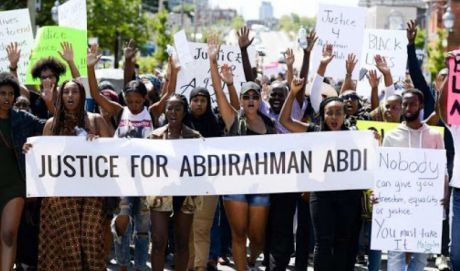Reports
You are here
Justice for Abdirahman Abdi!

October 20, 2020
“Today there was no conviction, but conviction remains in our hearts“
These words were spoken at a media conference and rally for Abdirahman Abdi, a 37-year old Black man of Somali origin living with mental health issues, murdered by police in July 2016. They were spoken on the day the cop who killed him was acquitted.
On October 20 an Ottawa court delivered a predictable verdict on the charges against Ottawa Constable Daniel Montsion: acquitted of manslaughter, aggravated assault and assault with a weapon. “Not Guilty” on all 3 charges.
Justice Robert Kelly said the Crown did not prove beyond a “reasonable doubt” that Montsion's actions caused Abdi's death. The judge also admitted that it was quite probable the cop dealt the blow that led to Abdi’s death, but couldn’t find the legal certainty.
This is yet another conviction of the criminal IN-justice system that makes “reasonable doubt” an impossible test to meet - and uses it to legally justify a police system that was never intended to be held to account.
City of Ottawa response
Councillor Jeff Leiper, in whose ward the murder occurred, tweeted: “To Abdirahman Abdi’s family, loved ones and his community, I’m sorry. Justice requires that we end state and societal sanction of violence perpetuated against the poor, the sick, and the racialized. Today’s judgment is an indictment of our city and country.”
Councillor Shawn Menard has brought forward a motion to Ottawa City Council that seeks changes to emergency responses in Ottawa. The motion calls on the Ottawa Police Services Board to undertake a public consultation and report outlining potential alternative models of community safety response that could involve the creation of non-police led response to calls which do not involve weapons or violence, such as those involving individuals experiencing mental health crises or drug addiction and where a police response is not necessary. The motion will be debated and voted on at the October 28th meeting of Ottawa City Council, and there is a call to sign the petition to support it.
As Shawn Menard’s office says: “It is rare to see law enforcement held to account and it is further evidence that we need alternatives to police-led emergency response calls.”
And the fight is not over in the courts either: a civil action launched some time ago had to wait until the criminal decision was rendered, and now will proceed: to sue the Ottawa Police Services Board and the two officers involved in Abdi’s murder.
But whatever well-deserved financial damages can be won through this for a family in grief, it will not truly bring justice or prevent this from happening again. And whatever crocodile tears come from Ottawa Mayor Jim Watson for Abdi’s family and friends,, BIPOC people in Ottawa will not be safe until we fully defund the police and provide real alternatives – and the only way to do that is through mass mobilization.
The police can be sued and be made to pay (as they should) and they can be partially reformed (as they should). But as long as they exist, there is no lasting safety.
Their conviction and ours: from the courts to the streets
Every July 24 since 2016, a crowd has gathered at 55 Hilda, where Abdi was murdered. On October 20, a crowd that was set to gather there changed location to one adjacent to Ottawa City Hall.
The supporters first heard impassioned speeches by those connected to the campaign and the trial. Signs read “Defund the Police” and “Mental illness is not a crime.” Then the crowd occupied the intersection directly in front of City Hall, with chants of “Black Lives, they matter here.”
The organizers announced to the protestors: “We’re going to stay as long as possible” – and they did. Cops showed up when the blockade occurred but then quickly left – the sign of a strong movement.
The march ended on Parliament Hill, but it doesn’t seem like the conviction to continue has ended here in Ottawa. As everywhere, the debate has just begun over what kind of alternatives to policing can exist in a society so fundamentally steeped in racism and the policed protection of the rich who are so deeply invested in racism.
But it is an important debate to have – and since the movement that erupted over the murder of George Floyd, this debate has become more than a legal question: it’s about what kind of social justice we want and need.
This moment is about the memory of Abdirahman Abdi, his family and friends. But it cannot be only about that, as the family and the Coalition for Justice for Abdirahman Abdi have said themselves.
Because if it becomes only about that - about that individual, unjust tragedy - it will lose the only thing that was not sickening and nonsensical about Abdirahman’s death.
Section:
Topics:









